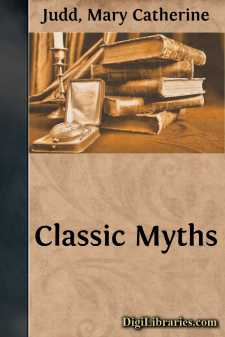Categories
- Antiques & Collectibles 13
- Architecture 36
- Art 48
- Bibles 22
- Biography & Autobiography 813
- Body, Mind & Spirit 142
- Business & Economics 28
- Children's Books 15
- Children's Fiction 12
- Computers 4
- Cooking 94
- Crafts & Hobbies 4
- Drama 346
- Education 46
- Family & Relationships 57
- Fiction 11829
- Games 19
- Gardening 17
- Health & Fitness 34
- History 1377
- House & Home 1
- Humor 147
- Juvenile Fiction 1873
- Juvenile Nonfiction 202
- Language Arts & Disciplines 88
- Law 16
- Literary Collections 686
- Literary Criticism 179
- Mathematics 13
- Medical 41
- Music 40
- Nature 179
- Non-Classifiable 1768
- Performing Arts 7
- Periodicals 1453
- Philosophy 64
- Photography 2
- Poetry 896
- Political Science 203
- Psychology 42
- Reference 154
- Religion 513
- Science 126
- Self-Help 84
- Social Science 81
- Sports & Recreation 34
- Study Aids 3
- Technology & Engineering 59
- Transportation 23
- Travel 463
- True Crime 29
Classic Myths
Description:
Excerpt
HOW THE HORSES OF THE SUN RAN AWAY
Greek
Phaeton was the child of the Sun-god, Apollo.
"Mother Clymene," said the boy one day, "I am going to visit my father's palace."
"It is well," she answered. "The land where the Sun rises is not far from this. Go and ask a gift from him."
That night Phaeton bound his sandals more tightly, and, wrapping a thicker silken robe about him, started for the land of Sunrise, sometimes called India by mankind.
Many nights and many days he traveled, but his sandals never wore out nor did his robe make him too hot or too cold.
At last, as he climbed the highest mountain peak of all the earth, he saw the glittering columns of his father's palace. As he came nearer he found that they were covered with millions of precious stones and inlaid with gold. When he started to climb the numberless stairs, the silver doors of the palace flew open, and he saw the wonderful ivory ceiling and the walls of the long hall.
He was glad that the steps were many and he looked long at the pictures carved on the walls by an immortal artist.
There were pictures of both land and sea. On the right was earth with its towns, forests, and rivers, and the beings that live in each. On the left was the ocean with its mermaids sporting among the waves, riding on the backs of fishes, or sitting on the rocks drying their sea-green hair. Their faces were alike, yet not alike, as sisters ought to be.
Up, up the hundreds of steps he climbed, never wearied. On the ceiling of this marvelous hall he could see carved the stars of heaven. On the silver doors were the twelve strange beings of the sky, formed of stars; six on each door.
The last step was reached. Outside the sky was dark, but at the doorway Phaeton stopped, for the light from his father was more than he could bear. There sat Apollo, dressed in crimson, on a throne which glittered with diamonds. On his right hand and on his left stood the Days, bright with hope; and the Months, hand in hand with the Days, seemed listening to what the Years were whispering to them.
Phaeton saw there the four seasons. Spring, young and lovely, came first, her head crowned with flowers. Next came Summer, with her robe of roses thrown loosely about her and a garland of ripe wheat upon her head. Then came merry Autumn, his feet stained with grape juice; and last, icy Winter, with frosty beard and hair, and Phaeton shivered as he looked at him. Dazzled by the light, and startled to find himself in such a presence, he stood still.
The Sun, seeing him with the eye that sees everything, asked:
"Why are you here?"
"Apollo, my father, grant me one request, that I may prove to mortals that you are my father."
Apollo laid aside his dazzling crown of rays, clasped Phaeton in his arms and said:
"Brave son, ask what you will, the gift is yours."
Quicker than a flash from his father's crown came the question from Phaeton:
"Will you let me for one day drive your chariot?"
Foolish father, foolish son! Apollo shook his head three times in warning.
"I have spoken rashly....


